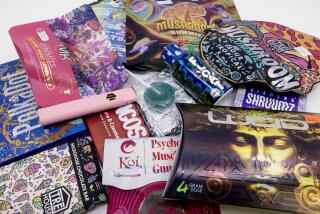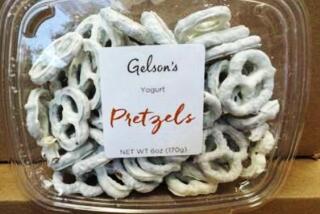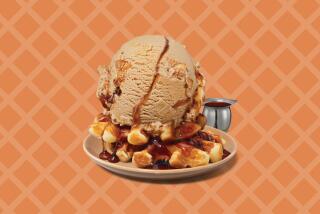Pinkberry passes test, but cold war goes on
- Share via
Score one for Pinkberry in the latest round of the all-out Southern California frozen-yogurt fight.
The growing Pinkberry Inc. chain took a couple of body blows last month, when two consumer lawsuits were filed contending that the popular frozen dessert lacked the healthy bacteria cultures found in yogurt.
Making matters worse, Los Angeles-based Pinkberry can’t call its product frozen yogurt because it is mixed in the stores, not at a manufacturing plant as required by state regulations, authorities said. Pinkberry said its product contained yogurt, as well as a powder, but declined to say what else was in it.
Intrigued by the mystery of whether the product is actually yogurt, The Times sent samples of Pinkberry -- along with Golden Spoon and Baskin-Robbins frozen yogurt -- to a food lab for analysis.
The test results were clear: “Bottom line, they all had cultures,” said Brian Parmenter of Bodycote FPL, a food-testing lab in Portland, Ore. What’s more, they are all relatively low-calorie and fat-free. Of the three samples, Pinkberry logged the lowest calories per ounce with 26 and undetectable levels of fat.
“It’s what we’ve been saying all along,” said Heather Wilson, the publicist hired by Pinkberry to deflect the controversy.
Problem licked, right?
But wait, wait, wait, it’s not that simple -- or so say the attorneys who filed the lawsuits. Pinkberry isn’t meeting the minimum 10 million cultures per gram required in frozen yogurt at the point of manufacturing, they say, and there’s still that problem of where the yogurt is mixed.
“That’s not really the whole story,” attorney Mary Glarum said. “There are still a lot of open questions. If they have nothing to hide, than they should tell people what’s in their product.”
State officials agree that Pinkberry is still out of compliance, at least for a couple of more weeks, but so are a number of other start-up frozen yogurt businesses, California Department of Food and Agriculture spokesman Steve Lyle said.
“Pinkberry appears to be making a good-faith effort ... and hopefully we’ll be there soon,” he said.
--
--
Begin text of infobox
Not a taste test
The Los Angeles Times sent three samples to a food lab for analysis to determine whether they contained live bacterial cultures commonly found in yogurt. The short answer: yes. State regulations say that in order to be called frozen yogurt, the dessert must contain at least 10 million cultures per gram.
*--* Baskin Robbins Pinkberry Golden Spoon (vanilla) (plain) (vanilla) Fat 0.1% None detected 0.2% Calories per ounce 37 26 33 Protein 4.7% 4.8% 3.8% Carbohydrates 27.6% 18.4% 24.9% Bacterial cultures per gram* 200,000 69,000 3,600
*--*
*Based on samples purchased at local stores and shipped overnight on dry ice. Culture counts are below state requirements because state testing occurs at time of manufacturing.
--
Source: Bodycote Testing Group
More to Read
Inside the business of entertainment
The Wide Shot brings you news, analysis and insights on everything from streaming wars to production — and what it all means for the future.
You may occasionally receive promotional content from the Los Angeles Times.








